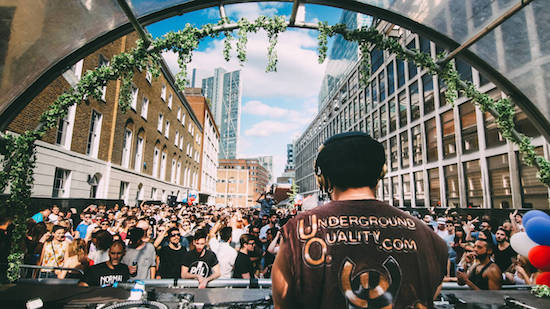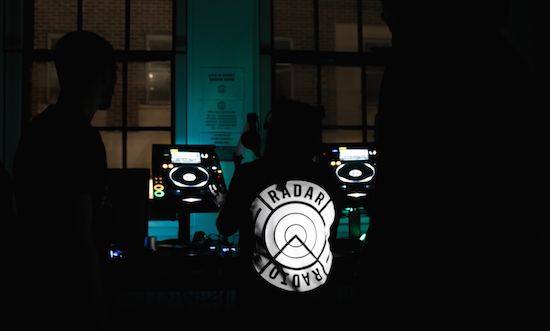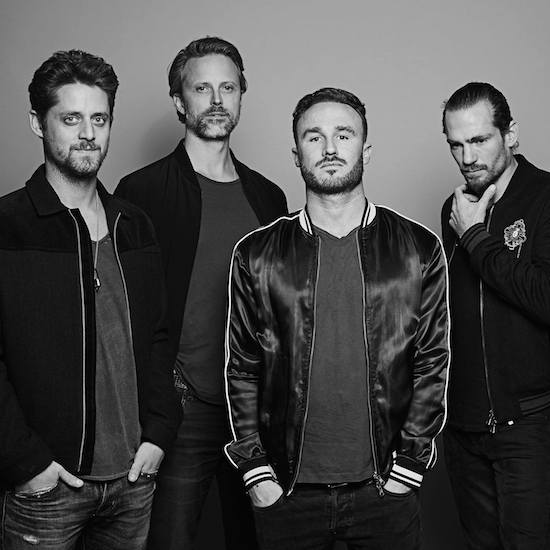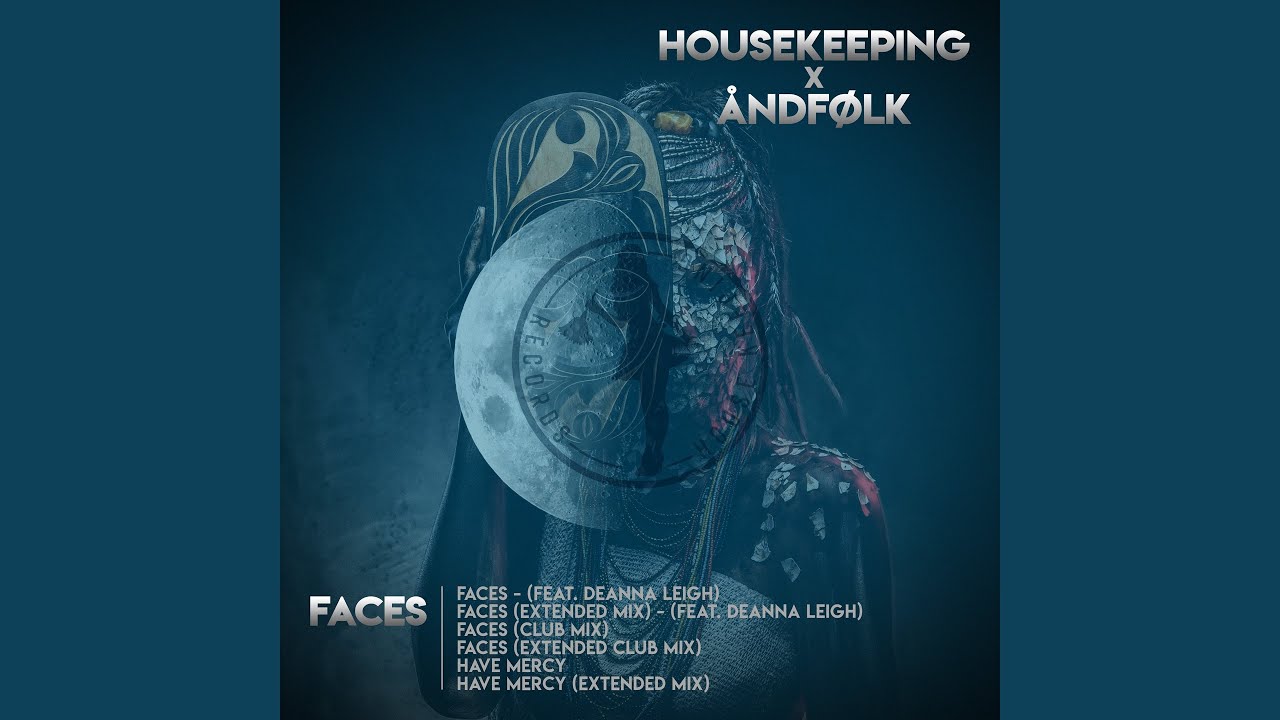The importance of a piece of music can sometimes be disconnected entirely from the sounds it contains. So it goes with Faces, the latest EP from London-based DJ collective Housekeeping: an utterly unremarkable slab of tech-house which nonetheless prompts complex questions about underground electronic music in 2020.
The EP itself floats by in a blur of mediocrity, notable only for its steadfast refusal to challenge even the tamest clichés of mainstream club music: tautly-mixed kick drums sit politely alongside shuffling percussion, filter-swept basslines and elegantly narcotised vocals. B-side ‘Have Mercy’ is adventurous by comparison, with its facsimile of an old-timey gospel sample, but still ends up sounding like Disclosure remixing Moby’s Play. Everything here is terribly well-mannered, flawlessly produced and almost incomprehensibly boring.
The most notable aspect of Faces is not its underwhelming sound, then, but the social and economic environment in which it’s been produced: one in which ostensibly underground music is increasingly co-opted by people whose wider interests serve to destabilise the very cultures they claim to champion.
As they tell it, Housekeeping’s rise to fame treads a familiar path: four DJs and promoters brought together by their love of house music, leveraging the sold-out London club nights they’ve been hosting for the last few years into prestigious residencies in Ibiza, showcases at fabric and tours of the US, Africa and Europe, as well as breathless profiles in the tabloids and coverage from parts of the dance music press. Like hundreds of artists before them, Housekeeping have seemingly put in the hard graft, working their way up from obscurity before breaking through. But at the risk of stating the obvious, whether in music or wider society, the very idea of meritocracy can be illusory.
Wealth and class play vital roles here. Given Housekeeping’s adoption of musical forms rooted in black, queer, and working-class struggles, it feels remiss to ignore the absolutely deranged levels of privilege to which all four of its members have access.
Tellingly, three of them tend to elide or remove references to their surnames, perhaps hoping to draw some distinction between their musical personas and their other public appearances. The mononymous Jacobi is a regular on the society pages under his full surname of Anstruther-Gough-Calthorpe, usually in relation to his aristocratic connections, while for Sebastian Macdonald-Hall (whose family’s combined wealth of £842m places them at 168th in this year’s Rich List), it’s his commercial real estate empire. Carl Waxberg appears positively relatable by comparison, having merely been a director at Citibank for 13 years before launching his own investment fund.
Socialite party planner and property developer Taylor HK, or Taylor McWilliams, is perhaps the most infamous member of Housekeeping. His development company Hondo Enterprises were met with protests after installing segregated “poor doors” in their luxury Aldgate apartment building in 2014. Four years later they bought Brixton Market, a long-running battleground in arguments over Brixton’s changing identity and the creeping forces of gentrification.
Hondo’s relationship with market residents Nour Cash & Carry, a family-owned grocer catering to the local community for over 20 years, has particularly infuriated Brixton residents. Having identified Nour’s current location as their preferred site for a new electricity substation and served them with an eviction notice in January 2020, Hondo initially claimed that an alternative site had been identified for Nour to relocate to, but as The Guardian’s restaurant critic and Nour regular Jay Rayner revealed, that space hadn’t been built yet, and indeed didn’t even have planning permission.
The dispute took another turn in late April, two weeks before Faces was released. During a Zoom-based Housekeeping DJ set for the Red Cross’ coronavirus appeal, activist group #SaveNour stormed into the video chat, waving placards bemoaning the dissonance between McWilliams’ apparent benevolence and Hondo’s impact on pandemic-afflicted small businesses. “Hey Taylor!”, one such banner read, “You party while your tenants suffer – stop Brixton Market evictions now”.
For most, the friction between house music’s emancipatory ideals and the social realities of neoliberal property speculation should be obvious, but Housekeeping seem to view the two as morally distinct. In a press statement released after the #SaveNour protest, McWilliams’ fellow DJs refer to Hondo as “a separate business unrelated to Housekeeping.”
But the truth isn’t quite as clear-cut. The latest accounts for Housekeeping Events Ltd. (sole director: Taylor McWilliams) reveal that they’ve received roughly £200,000 in loans from Hondo and McWilliams himself, with no interest charged and no date for repayment. While the exact link between this holding company and Housekeeping’s public brand remains opaque, it’s unclear how “separate” they can be from Hondo, if it ends up that one is indeed funnelling six-figure sums to the other.
These questions get even murkier when the fate of Club 414 is added to the conversation. One of Brixton’s longest-running venues and situated next to Brixton Market, 414 has been home to everything from underground jazz nights to South London’s surviving hard house and acid techno scenes. Its communal, rough-edged charm and connection to under-served groups embody the raw, original urgency of house music as a social force.

Hondo’s purchase of 414’s premises in late 2019 was framed as an attempt to “save” the venue, which had been closed for the previous six months. However, its existing managers Tony Pommell and Louise Barron were forced out following the sale, making McWilliams’ claims to be “preserving [Brixton’s] unique history and culture” harder to understand.
The website for Tape London, the private members’ club in Mayfair founded by McWilliams’ DJ partner Anstruther-Gough-Calthorpe, may offer some clues about 414’s future: “Our policy at Tape is smart, elegant and on trend. To avoid disappointment at the door we strongly advise you to dress to impress. Avoiding flip-flops, shorts, athletic wear, baseball caps, hooded jumpers.” Interestingly, Tape also has an apparel store, selling a range of branded baseball caps and hoodies, all presumably prohibited by its own door policies. Readers carefully attuned to social nuance may hazard a guess at the two different audiences seemingly being catered to here.
Housekeeping’s underlying ideology appears to be summed up in this passage from a 2018 profile on the group: “After all, house music was created right here in North America… it was always supposed to be about fun and wild escape, about losing yourself without caring, and about loving your neighbour – or fellow dancer, as it were – no matter their race, gender or class.”
With that last line, house’s roots in marginalised identities are quietly eroded, along with others’ responsibility to tread carefully around those historical associations. A notional equality, imposed by the bearers of extraordinary privilege on cultural and musical forms created by queer working-class people of colour, is no form of equality at all. When Taylor and his crew talk elsewhere about the hedonism of their parties, they’re invoking a spiritual heritage drawn not from Ron Hardy or Stonewall, but from the polo fields of Harrow, the members’ clubs of Mayfair, and the post-2008 bank bailout.
So far, so predictable. Housekeeping certainly aren’t the first people to whitewash historically marginalised music, or downplay their roots in order to bolster their underground credibility. Maybe it’s futile to worry about a bunch of bankers, landlords and aristocrats playing pedestrian techno for their well-connected mates in the West End? And yet while Housekeeping might be easy to write off, the wider tendencies they reflect shouldn’t be.
As profits and audiences for electronic music have ballooned over the last decade, its infrastructure has increasingly been annexed by large entertainment conglomerates, our language shifting almost imperceptibly from vaguely egalitarian talk of ‘club culture’ to the creepily neoliberal ‘night-time economy’ in the process. Everything from inflated artists’ fees to soaring rents and council cuts have served to squeeze out grassroots promoters and decimate small-scale venues in the UK over the last ten years; an increasingly professionalised, competitive and hostile marketplace has centralised around UK powerhouses like the Columbo Group and global behemoths like Live Nation, AEG and (until recently) Red Bull.
But the same process is arguably reflected on an individual level too: as barriers to entry have risen, people from backgrounds of notable wealth and privilege have taken increasingly visible ownership of ostensibly countercultural platforms (with that context rarely noted in public discussions of their creative output). None are anywhere near as egregious or unsettling as Housekeeping, but several exhibit similar traits.

Comparisons could be drawn to Krankbrother, the promoter / DJ duo who in recent years have grabbed a significant slice of London’s club and festival market. Focusing on experimental techno and South London jazz, they’ve received overwhelming plaudits in the process. Less widely mentioned in the music press are their previous forays into upmarket parties and high-end oyster restaurants, or the prodigious wealth of their family, who own the massive construction company Clancy Docwra.
Privately-educated and Daily Mail-endorsed Boiler Room owner Blaise Bellville ruffled feathers in 2017 when Arts Council England awarded his venture-capital-backed company substantial funding to document Notting Hill Carnival. The collapse of Radar Radio in 2018 was sparked by allegations of sexual harassment, but undoubtedly accelerated by listeners’ belated realisation of the station’s familial and financial links to Mike Ashley’s Sports Direct empire. The cluster of businesses connected to The Vinyl Factory may have avoided any such potential scandals, but remain interwoven with their owners’ extensive property interests and society connections. Berlin online music channel Colors keeps its ownership relatively quiet, but has intriguing links to global finance via its proprietor’s incubator and investment firm. These are far from the only examples.
The same principles filter down in even less visible form to artist level, but are rarely discussed consistently or publicly. A Twitter thread from journalist Shawn Reynaldo last year pointedly asked: in a scene which touts itself as progressive on issues of gender, sexuality, race and representation, why is there so little open, transparent discussion of class or wealth, the means by which artists’ creative endeavours are funded, or the cultural distortions those imbalances can create?
To be clear, noting these issues shouldn’t constitute a simplistic ‘calling out’ of those involved or a dismissal of their achievements: Boiler Room, Colors and Radar have all played vital roles in broadening access to global music culture for artists – providing a platform for musicians from all different walks of life around the world – and listeners alike, while Krankbrother’s events are invariably superb. Patronage of the arts by wealthy people is hardly new. Neither does it preclude deeply talented people from sinking hard-fought time and energy into projects they genuinely believe in, enabling the creation of beautiful, otherwise-impossible projects the rest of us benefit from.
Similarly, it’s easy to see why the complex mesh of obligations facing artists, journalists, PRs, promoters, agents and audiences makes public discussion of these issues a thornier proposition. Why rock the boat, particularly when underground music <a href=“https://thequietus.com/articles/27983-coronavirus-pandemic-music-disaster" target="out">faces such profound and existential challenges from coronavirus, if it means alienating the people you rely on, torpedoing your own career or those of your friends? Does it ultimately matter if a growing number of rich kids and venture capitalists are fronting the costs and taking the plaudits?
And yet the examples set by Housekeeping and their ilk suggests that it does. In an excellent 2019 DJ Mag article on the influence of class and wealth on dance music, guarded references are made to unnamed London promoters with deep pockets, who “consistently spend over the odds on DJ fees, which pushes them up across the board.” The distorting effects of private and corporate wealth have a material effect on the sustainability of those lower on the ladder, and ultimately the cultures they embody: both issues which are hard to quantify (who’s keeping track of all the artists or scenes who never make it?) and likely to become vastly more acute in our unknown post-coronavirus future. We got a glimpse of those prospects with last week’s incredibly depressing video from a socially-distanced rave in Germany, for which a reduced number of attendees were charged an inflated entrance fee, raising difficult questions about financial accessibility and the competing interests of media platforms covering dance music.

Other social impacts are even more diffuse, but equally corrosive. The author Natalie Olah nails the distorting effect of class-based cultural cosplay in her superb book Steal As Much As You Can. “Young inheritors of the white middle class seeking to lay claim to something cool and edgy are increasingly drawn to aspects of working-class culture that they judge to be gauche, exciting and strange,” she writes. “This fetishisation only makes class divisions more entrenched, by further pushing the working-class experience into the realm of morbid spectacle… After all, an aristocrat’s son wearing a tracksuit remains an aristocrat’s son.”
If it feels risky to raise these issues at such a precarious time, the reverse is equally arguable too: at a moment when traditional assumptions, hierarchies and power structures across the music industry and wider society face unprecedented destabilisation, the danger of our collective resources being fenced off feels very real, and the alternatives suddenly, tantalisingly graspable.
One phrase that’s popped up in recent months is “interdependent” music, usually in opposition to debased notions of “independent.” We’ve all ended up as atomised cultural producers, this line of thinking goes, answerable only to ourselves: now our creative freedom is secured, what matters is building new networks of solidarity and mutual support. Co-operative ownership of platforms, local DIY support networks insulated from the rapaciousness of global capital or online content churn, and collective resistance to the sinister intentions of the streaming industry could each offer us a chance to sidestep the ongoing centralisation of power, and mitigate the outsized influence of private wealth and privilege.
Another approach might simply be to make these questions more visible, and allow people to make up their own minds. While the unspoken disconnect between cultural and financial identities might be wearingly familiar within journalistic and industry circles, the social media response to Radar Radio’s collapse in particular, in which the realisation of links between its cultural output and Sports Direct’s well-documented employment abuses prompted waves of shock and outrage, suggests that these issues aren’t quite so self-evident to audiences and fans.
The same process may now be repeating with Housekeeping, after #SaveNour mobilised a number of DJs and promoters in public support of their campaign. In Boiler Room’s case, this extended to a boycott of McWilliams and his friends until Nour no longer faces eviction. While this display of solidarity is undoubtedly welcome, it seems somewhat counterintuitive that Boiler Room (or fellow Nour supporters Lovebox, owned by Live Nation) could so seamlessly slip into protesting against underground music’s infiltration by personal privilege and corporate wealth. It seems there’s a wider, more structural and potentially less comfortable conversation still to be had.
By collectively acquiescing to the status quo, those inside the industry risk closing off opportunities we never knew were possible; by declining to discuss these issues out of deference, politeness or self-preservation, we render ourselves incapable of changing them, or properly weighing up the compromises they demand. When a globetrotting DJ is lauded as ‘a potent force for change’ in a puff piece promoting their appearance at Coachella, or when media companies are busy engaging in further coronavirus-inspired bloodletting, maybe it’s a sign that our tools for addressing these issues are just fundamentally broken.
And yet listening to Faces still feels like a rubicon being crossed, the end point of our collective reluctance to engage. Here, the price of entry is set by those with cash to burn, our supposedly progressive forms of expression smoothly repurposed to launder the worst excesses of global capitalism. When we’re imagining the post-pandemic world we want to re-emerge into, and the sterile, regressive visions represented by Housekeeping, it seems fair to ask: is this really the best we can do?



